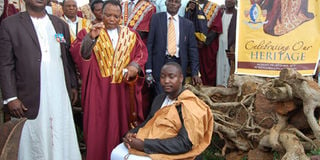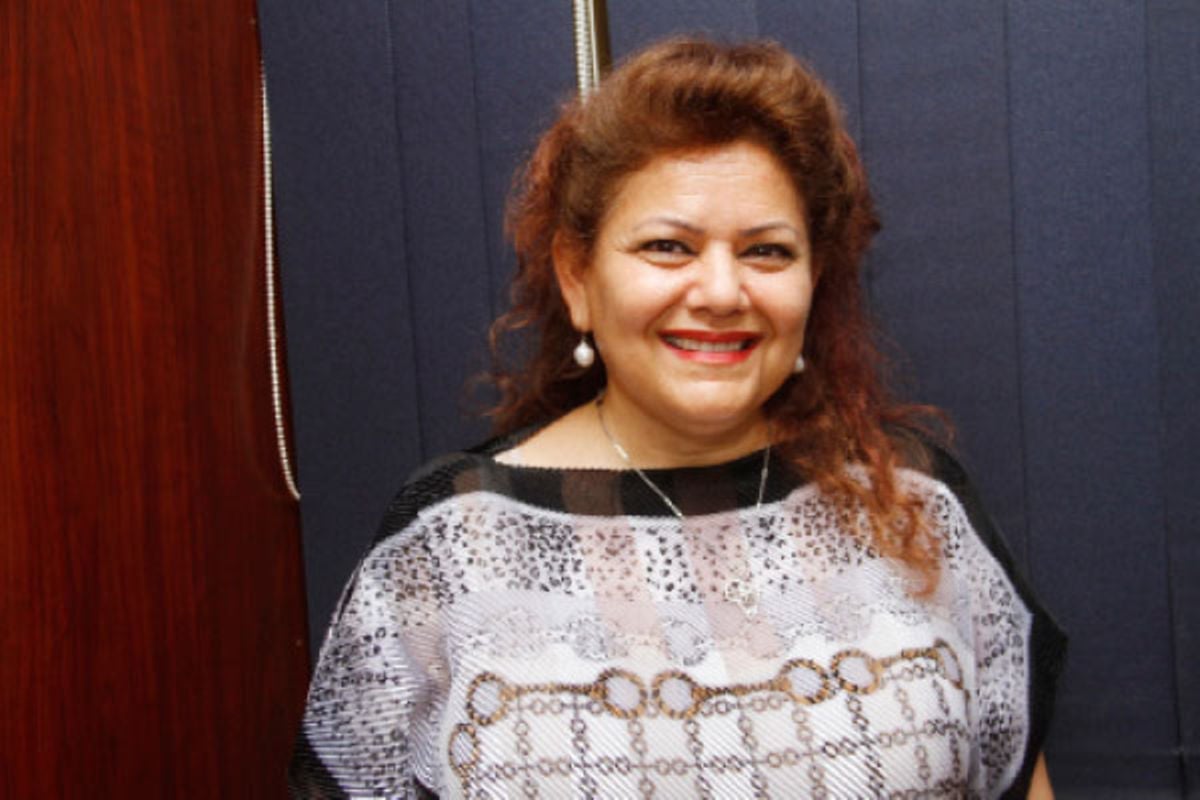Are kingdoms still relevant?

Kyabazinga William Gabula Nadiope IV (seated) soon after he was elected Busoga’s king recently. File photo
What you need to know:
Analysts say whereas the role of cultural institutions is to unite communities, today, the chiefdoms and kingdoms have caused more disharmony.
In the past five years alone, the country has had its fair share of bad blood stemming from rivalry over traditional leadership.
In September 2009, lives were lost in Buganda after the government blocked the then Buganda Katikkiro Eng J B Walusimbi from travelling to Kayunga (Bugerere county) that was under contestation between Buganda and the Sabanyala. Kabaka Mutebi was supposed to visit the area in a matter of days. He, however, visited the district last year.
In July, several lives were lost in Kasese. Ntoroko and Bundibugyo districts when reported tribal sentiments flared up involving the three tribes of Bakonzo, Bamba and Basongora in the Rwenzori sub-region. The authorities blamed this on cultural differences.
Just last month, even after William Gabula Nadiope IV was elected new Busoga king, another group remained unsatisfied with the developments. They believed Prince Columbus Wambuzi should have taken the crown. The hullaballoo drew the attention of the President and Speaker of Parliament Rebecca Kadaga.
In Lango, disagreements have pitted the Paramount Chief, Won’Nyaci Yosam Odur, against clan leaders. The Lango constitution says the clan leaders are charged with the responsibility of electing the cultural leader and that the Paramount Chief should be aged between 60 and 80 years.
However, the clan elders have pointed an accusing finger at Chief Odur for going against this constitutional provision. They now claim the traditional leader is past 80 years and is unwilling to relinquish the position.
This has prompted the aggrieved clan leaders to elect Mr Benjamin Okii as a parallel cultural leader.
What leaders say
With the above examples of cultural clashes and differences in opinion, the question of whether cultural institutions are still relevant today calls for answers.
Buganda Kingdom minister for justice and constitutional affairs Apollo Makubuya says kingdoms are much relevant despite the increasing erosion of African culture at the expense of the Western culture. He adds that for the Baganda, they believe in federal governance rather than the republican mode of operation where a leader is chosen as opposed to the hereditary.
“Kingdoms are embodiments of identity and for us in Buganda, it is for our culture, heritage, territorial belonging and helps us to be identified as people from Buganda. The Kabaka has a big chunk of land that identifies Buganda and it also explains the desire for a self-rule through federal governance,” Mr Makubuya says.
He cautions that for those against kingdoms, they need to realise that kingdoms are much older and can enforce discipline among its subjects as opposed to the republican arrangement.
He dismisses the idea of a republican as none viable since its establishment in the 1960s by the late Apolo Milton Obote. He warns that as Buganda, they will always subscribe to the Kabaka (king) more than a republican president who is elected.
“Buganda is 600 years and Uganda is just 52 years and if the kingdoms were useless, would people come out and contribute like people are doing now for Buganda? Republican is what Obote wanted to implement in 1960s but for us we are strongly supportive of kingdoms where they exist. However, republican is for some people in Kabale and maybe now Busoga where they claim to be republicans. For us we are for kings or queens.”
Bunyoro says
Mr Ford Mirima, Bunyoro Kingdom’s first secretary to the Omukama, who doubles as spokesperson, concurs with Mr Makubuya on relevance of kingdoms but says apart from the traditional kingdoms of Bunyoro, Tooro, Buganda and Nkore, these newly created ones have less significance. He says they were created less for monetary value and co-existence of small tribes.
“We have four kingdoms originally and these others were chiefdoms. But the Constitution says if people have attachment to their culture, they are free to have a traditional leader. The President has attached monetary value to them,” Mirima says.
He adds: “The moment he created these kingdoms, he created ethnicity and one wonders why we have a republican with kingdoms and isn’t that a contradiction?”
According to Mr Mwabutsya Ndebesa, a lecturer at the department of History, Archaeology and Organisational Studies, Makerere University, kingdoms are relevant provided they are not used as instruments of patronage.
Mr Ndebesa says kingdoms are supposed to unite people under their areas of authority but to the contrary, today kingdoms have become sources of intra tribal wars.
Role of kingdoms
“Ideally, kingdoms are supposed to unite people and culture is to serve man and not man to serve culture. But look at what is happening in Busoga, Bugisu and Lango where culture has divided people. Now in Buganda, where there was one kingdom are now so many,” Mr Ndebesa says.
He adds: “It is difficult to believe those kingdoms are for culture but not new political parties because they have become patronage of political power for regimes to survive”
In Bugisu, Wash Kanyanya who claims to represent Bukusu, who are mainly in western Kenya, is asserting authority over Inzuu Ya Masaba (house of Masaba) led by Ambassador Wilson Wamimbi.
Speaking recently about the Rwenzori sub-region attacks, police boss Gen Kale Kayihura, said the killings in Kasese and Bundibugyo in July are part of those agitating for the Bwera republic.
The Bakonzo and other communities across in the Democratic Republic of Congo are at the forefront in the reported fight for Bwera republic.
Ndebesa says the current predicament should be blamed on President Museveni for returning kingdoms in the early 1990s without giving chance to the Constituent Assembly that was about to debate the operationalisation of kingdoms. Ndebesa says the current arrangement only serves to breed greed and intra tribal wars.
Problem
“I foresee a problem in future, how kingdoms were restored wasn’t clear because Mr Museveni went to Gulu Barracks to pre-empty what was supposed to be discussed in Constituent Assembly. If we want to elect any traditional leader, then there must be a clear Constitutional mandate. Otherwise intra-tribal, cultural politics is very dangerous and we must tread carefully,” Mr Ndebesa says.
Gen Kayihura says people confuse governance and culture to be one because at the time when colonialist came, kingdoms had executive authority and as they were restored in 1993, they still believed in those powers up to date and that explains why some are at logger heads with the central government.
“There is a clear demarcation between a traditional institution which is purely for culture and governmental institutions. Now where the problem is coming in is the confusion where traditional institutions are assuming the role of government. But this is not their role and consequently, they want kingdoms to have power and then mobilise and confuse…” Gen Kayihura said.
Gen Kayihura says traditional institutions have their own cultural setting while a republican government is different.
When asked about the accusation that small kingdoms are used for patronage, Sabanyala of Bunyala Baker Kimeze denied the accusation, saying the kingdoms are purposely for cultural and unification purposes.
With the development and push for the East African Community, the question of the relevance of cultural institutions remains an a white elephant to many.




